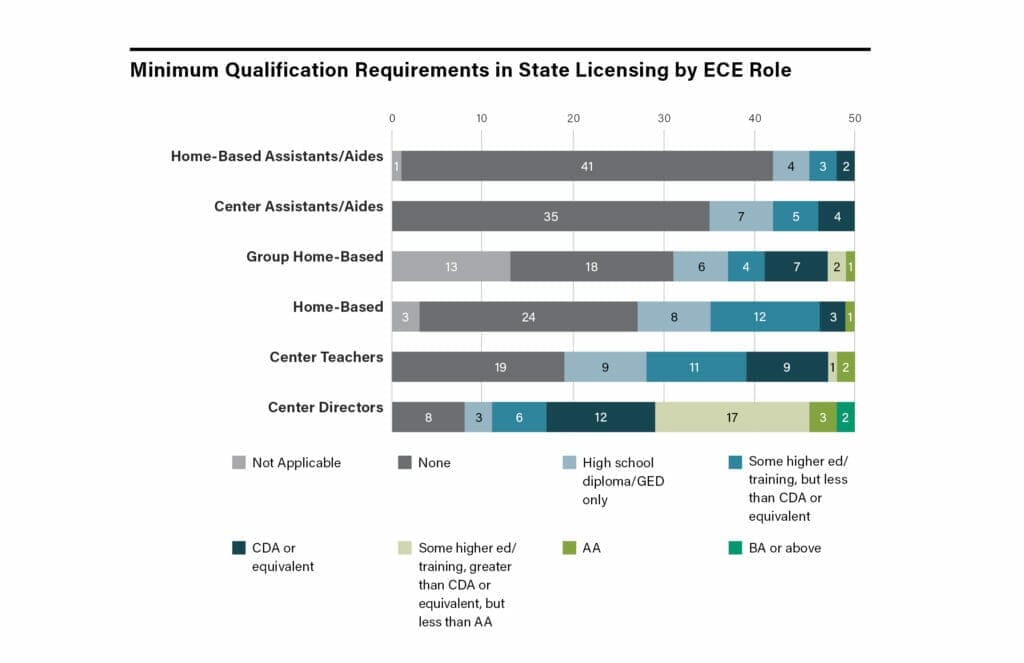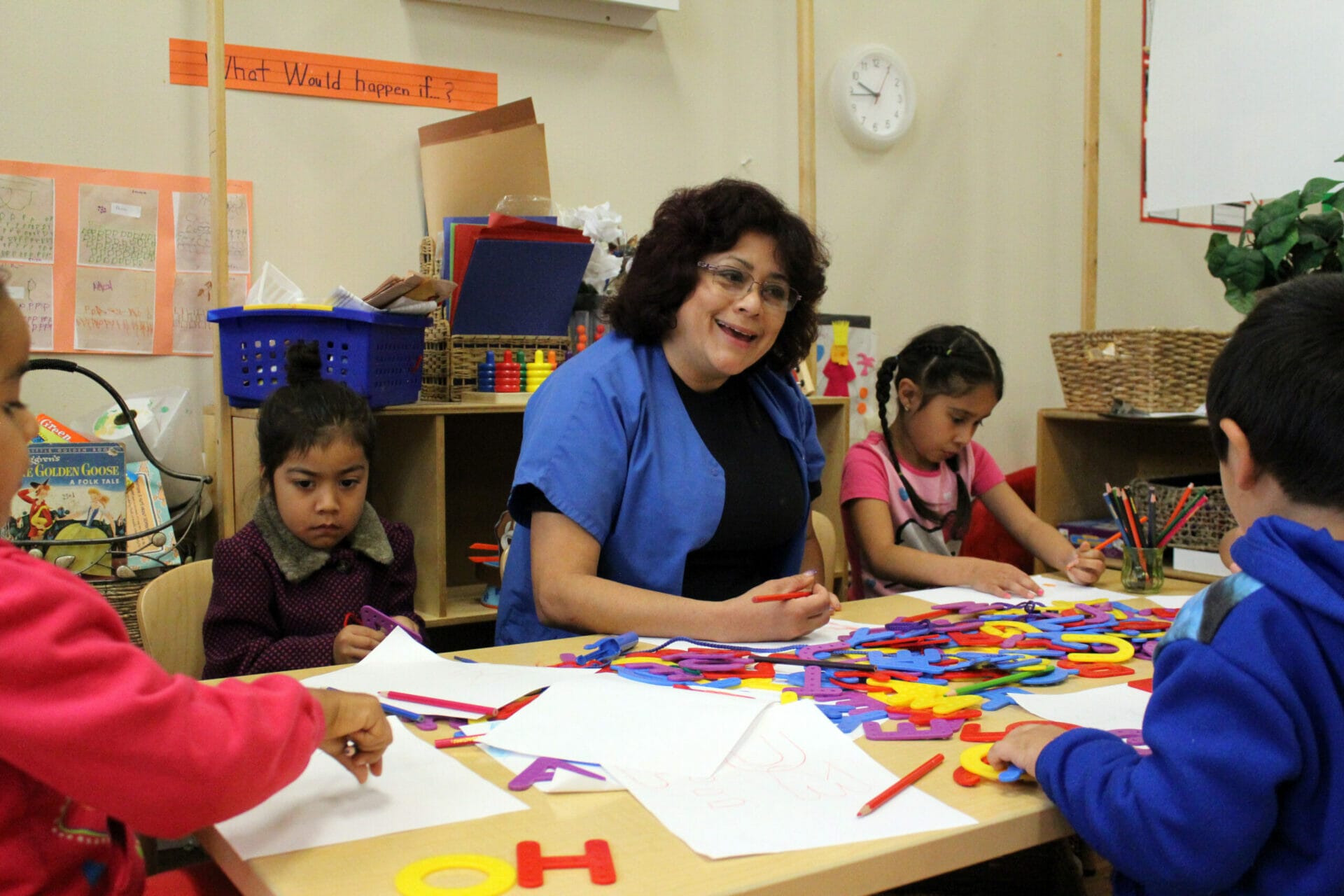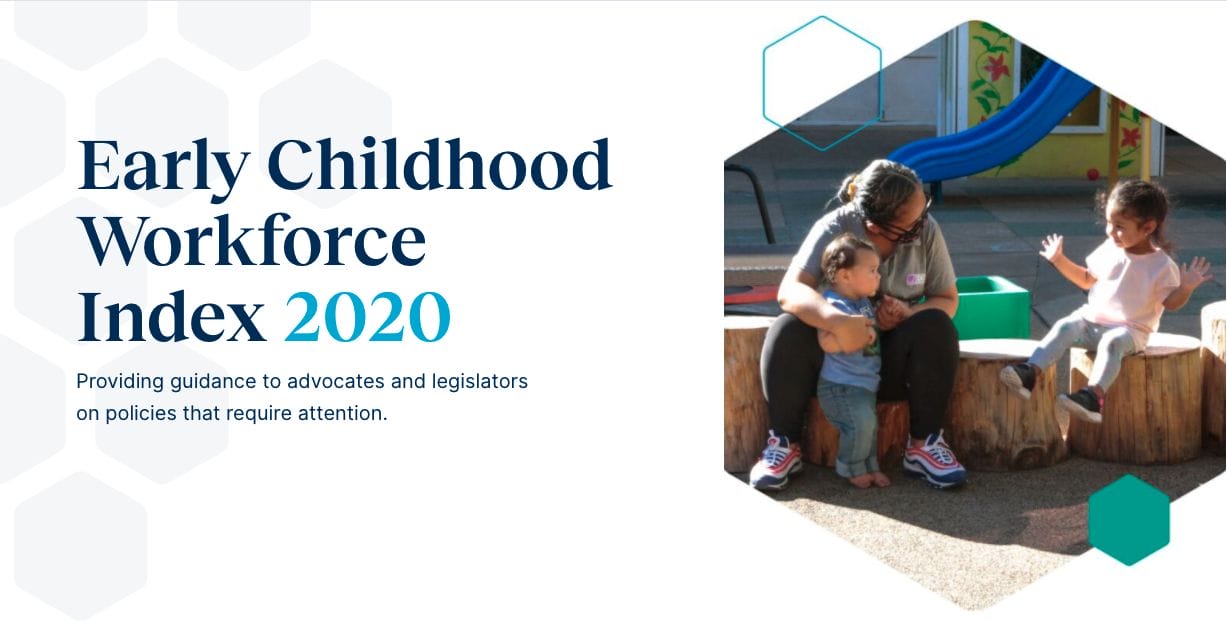Research is clear that early educators play a central role in facilitating learning and development among children birth to age five. Yet a gap exists between our understanding of the skills it takes to educate and care for children in their most critical stage of development and the codified expectations of early educators’ knowledge and abilities.
In K-12 education, there is well-established consensus that teachers should obtain at least a bachelor’s degree plus a grade- or subject-specific certification, reflected in state teacher licensure requirements. A similar view has been growing in early care and education (ECE) circles: experts recommend that lead teachers and program administrators acquire degrees and specialization equivalent to those working in elementary schools and that others working with young children, like assistant teachers or aides, attain foundational knowledge, such as a Child Development Associate Credential.
Despite growing recognition that more rigorous and consistent qualifications are needed for early educators, current requirements across states are low and uneven, depending more on the type of setting and funding of programs than on the roles and responsibilities of the workforce. A review of minimum early educator qualification requirements in the 2018 Early Childhood Workforce Index showed that:
- Some states treat publicly funded pre-K teachers as part of the teaching workforce, with commensurate qualification expectations:
- In the 44 states (including the District of Columbia) that have public pre-K programs, only 23 require a minimum of a bachelor’s degree for lead pre-K teachers across all settings and across all programs (for states with more than one state-funded pre-K program). An additional 14 states require a bachelor’s for pre-K teachers but only for certain types of programs or settings, such as public schools.
- The persistently low minimum qualifications that have been set for the majority of educators working with children birth to age five perpetuates the false notion that teaching in early education is less skilled than teaching older children:
- No states require lead teachers to have bachelor’s degrees in center-based programs outside of public pre-K programs or home-based programs (and only the District of Columbia and New Jersey even require center directors to have bachelor’s degrees).
- Very few states require any minimum educational requirements for home-based early educators.
As a result of these disparate requirements, the qualifications a child can expect their teacher to meet have little to do with their developmental and educational needs, but are instead dependent on the type of programs that are available and affordable for their family.

Source: Whitebook, M., McLean, C., Austin, L.J.E., & Edwards, B. (2018). Early Childhood Workforce Index – 2018. Berkeley, CA: Center for the Study of Child Care Employment, University of California, Berkeley.
Despite Low and Uneven Qualification Requirements, Many Early Educators Are Highly Educated
More than half of all center-based staff have already earned an associate degree or higher.
There is a false assumption that establishing higher qualifications means that most of the existing workforce would need to go from the minimum qualifications currently in place to earning bachelor’s degrees. However, many of those working with young children in ECE classrooms are not lead teachers, but assistants or aides. Second, the current workforce is not starting from scratch. The reality is that nationally, more than half of all center-based teaching staff have already earned an associate degree or higher: 35 percent have a bachelor’s degree or higher, and 17 percent have an associate degree. Nearly one-third of regulated home-based providers are similarly educated: 15 percent have a bachelor’s degree or higher, and 16 percent have an associate degree.
Scholarships Are Crucial to Increase Access, but Additional Supports Are Needed
In many states, scholarships and other supports to earn degrees or acquire specialized knowledge have assisted early educators to advance their skills and knowledge even when not required by state regulations. Nearly all states offer scholarships for early educators to pursue education or training, but the scope and impact of these scholarships varies both within and across states. About half the states offer T.E.A.C.H. scholarships, which provide robust financial and other supports (such as counseling and paid release time). Other scholarship programs for the ECE workforce are typically more limited. For example, most ECE scholarships do not cover the full cost of tuition, plus books and supplies, which is critical given the low wages of early educators. Additionally, despite their relative success, scholarships and other supports for early educators are typically underfunded and available to only a portion of the workforce. State policies related to free community college can provide another access point for early educators seeking to further their education, but eligibility for this benefit also varies greatly across states.
Additional supports necessary to promote access to degree programs and to help early educators thrive and succeed in their courses include academic supports such as cohort models, flexible class schedules (e.g., classes at night, on weekends), and academic counseling specific to early educators. Finally, policies like seamless articulation between associate degrees and from associate to bachelor’s degree programs, credit for prior learning, and differentiated field experiences for pre-service and experienced early educators provide increased access, particularly for experienced early educators returning to school, and also allow for a shorter time to completion for current and future educators.
Supports Are Crucial to Maintain Diversity, Disrupt Stratification
The ECE system in the United States is not immune to gender, class, and racial inequities that are woven throughout U.S. institutions and culture. About 40 percent of early educators are women of color, and they occupy a disproportionate share of the lowest-paying jobs in the field. Many of these early educators further experience historical and systemic barriers to accessing and successfully participating in education that impact, but are by no means unique to, the ECE field. Discussions about raising the educational bar frequently spark concerns about losing the diversity of the ECE field, but too often leave unexamined the strategies and resources needed to disrupt the long-standing barriers and systemic inequities that hinder successful participation in higher education, especially for women of color.
Our research surveys and interviews early educators directly, and our findings reveal that when barriers to education are removed and resources are provided, the existing workforce has demonstrated success in earning bachelor’s degrees. In a longitudinal study of early educators working in the field and participating in bachelor’s degree cohort completion programs, 40 percent of the study participants had made previous attempts to complete a four-year degree. With financial, academic, and access supports, early educators were successful: 81 percent of the cohort participants graduated, a rate more than double that of the typical transfer student from a two- or four-year institution. In addition, 76 percent were women of color, 31 percent identified their primary language spoken at home as being other than English, and most reported being among the first generation in their families to earn a college degree. These findings demonstrate that barriers reside within systems, not with the individuals who encounter them.
Improvements to ECE Teacher Preparation Programs Are Also Needed
In addition to promoting access supports to achieve higher qualifications, it is imperative to ensure that the higher education programs are intentionally designed to effectively prepare teachers. Studies have shown a strong link between teachers trained in high-quality early childhood education-focused bachelor’s degree programs and more positive child outcomes. But currently, early educator preparation programs do not consistently provide the following key elements:
- Competency-aligned curriculum spanning the birth-through-age-eight spectrum and delivered by diverse faculty with experience and expertise in early childhood;
- Multiple hands-on (field) experiences guided by mentor teachers throughout the degree program, so that students are able to put into practice what they learn in the classroom; and
- Supports available to students to encourage their success.
Instead, programs that may not even be designed to prepare teachers, but receive the ubiquitous categorization of being “early childhood related” are assumed to provide what early educators need and to produce similar outcomes.
Recommendations to Support Higher Education Among Early Educators
- Align qualification requirements with national recommendations: establish minimum requirements that reflect foundational knowledge for all early childhood teaching staff and program leaders and require a bachelor’s degree with ECE specialization for lead teachers and center directors, in line with what is required for teachers of older children.
- As new qualifications are enacted, simultaneously generate timelines for educators to meet new requirements and ensure adequate resources to support acquisition of any education, training, and certification that may be required.
- Ensure that all members of the current workforce have opportunities and supports to acquire education and training, with targeted opportunities and supports for members of minority racial and ethnic groups and individuals who speak English as a second language. Supports that have worked in various communities to date include:
- Cohort models;
- Classes in community locations;
- Flexible class schedules (nights, weekends);
- ECE-specific advising and academic counseling;
- Apprenticeship models combining work, education, and increases in wages; and
- Comprehensive scholarships (i.e., covering tuition, fees, books, technology, etc.).



